KARACHI: Pakistan’s newly appointed finance minister said on Monday that the country’s currency will strengthen to under 200 rupees to the U.S. dollar.
The rupee is currently at around 227 to the U.S. dollar, and the currency has been in turmoil, falling as much as 30 percent this year.
“The rupee’s real value is below 200 (to $1), and, God willing, it will come below 200 (rupees),” Minister Ishaq Dar said in an interview with local television channel Geo News.
He added that the rupee would be strengthened through government “policies” as the current rate was inflated due to speculation.
Dar, who was sworn in last week as finance minister for his fourth stint in the role, has strongly favored intervention in currency markets in the past.
Since Dar took over, the rupee has strengthened. According to central bank figures, Pakistan currently has just $8 billion in reserves, barely covering a month of imports, making market intervention through currency injections difficult.
The country was only recently able to restart an International Monetary Fund (IMF) bailout package after agreeing to undertake difficult reforms.
One of the agreements was to implement a market-determined exchange rate and to stop government intervention in the central bank.
Dar also defended his decision to slash fuel prices days after taking over — reversing a policy of raising prices monthly through added levies to ensure enhanced revenues as agreed with the IMF.
Dar said imposing additional levies was not justified as the country struggled with catastrophic floods that have killed more than 1,600 people and inflicted at least $30 billion in damages.
“I have been dealing with the IMF for the last 25 years; I will deal with it,” he said, referring to any potential reservations by the lender.
On Monday, the IMF said policy discussions, including how to target support to those affected by the floods while maintaining macroeconomic stability, will commence in coming weeks after the damage assessment report becomes available.
“Policy commitments made by the Pakistani authorities as part of the Seventh and Eighth review under their IMF-support program continue to apply,” IMF’s resident representative in Islamabad Esther Pérez Ruiz told Reuters in response to a question if the cuts had been discussed with the lender.


















